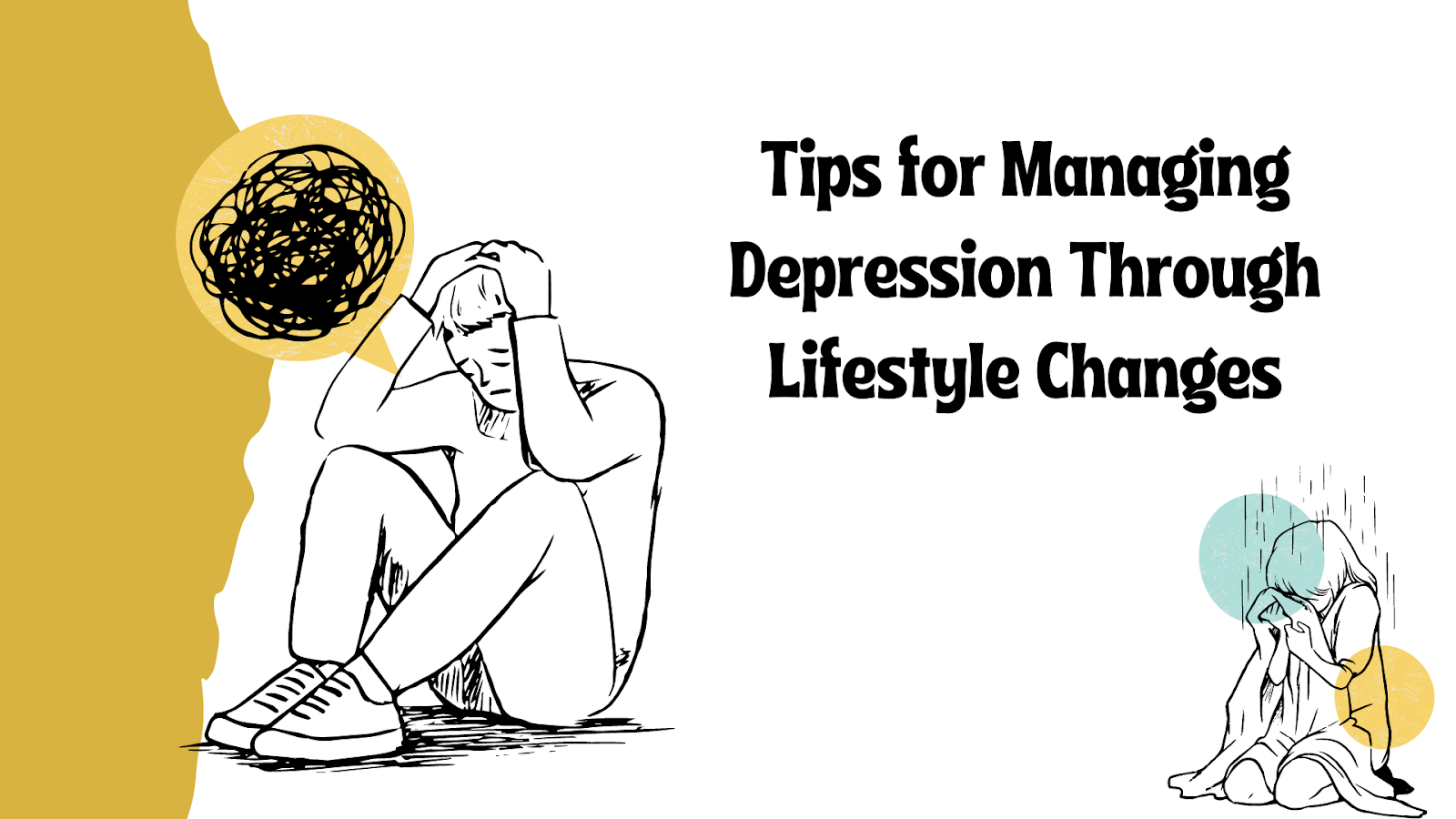Feeling Down? Take Charge of Your Mood with Lifestyle Shifts
Depression can cast a long shadow, but you don’t have to live in darkness. While clinical treatment can be invaluable, there are numerous ways to manage depression and enhance overall well-being through daily choices.
This guide explores impactful lifestyle changes that can notably improve your mood and empower you on your journey toward a brighter future. From healthy habits to stress-reduction techniques, let’s equip you with actionable tips to take control of your mental health and feel better naturally.
Prioritizing Physical Activity
Regular exercise is a powerful ally in the fight against depression. Numerous studies have demonstrated the mood-boosting effects of physical activity, thanks to the release of endorphins and other feel-good neurotransmitters. Exercise also promotes better sleep, increases energy levels, and enhances self-esteem – all vital components of mental wellness.
The Importance of Exercise
A recently published study suggests that adults who engage in regular aerobic exercise experience fewer symptoms of depression and enjoy an improved quality of life. The Centers for Disease Control and Prevention (CDC) recommends at least 150 minutes of moderate-intensity activity or 2 days of muscle-strengthening activity, combined with muscle-strengthening activities. If you’re unsure where to start or how to safely incorporate physical activity into your routine, consider consulting with primary care doctors near me, who provide personalized guidance based on your health status. They can help you create a tailored plan that aligns with your fitness goals and supports your mental well-being.
Finding the Right Exercise Routine
The beauty of exercise lies in its versatility. Whether you prefer the serenity of yoga, the rhythmic cadence of walking or jogging, the exhilaration of team sports, or the challenge of weightlifting, there’s an activity to suit every personality and preference. Explore various options until you discover a routine that you enjoy and can consistently maintain.
Consistency is Key
While it’s tempting to set lofty exercise goals, sustainability should be the priority. Begin with manageable steps and progressively increase your activity level as you develop endurance and confidence. Aim for at least 30 minutes of moderate exercise most days of the week, and celebrate each milestone along the way.
Optimizing Nutrition for Mental Health
Just as physical activity nourishes the body, a nutrient-rich diet can significantly impact mental well-being. Certain foods and eating habits have been linked to improved mood regulation and reduced depression risk.
Nutrient-Rich Diet
Foods abundant in omega-3 fatty acids, such as fatty fish (salmon, mackerel, tuna), walnuts, and flaxseeds, have been shown to have anti-inflammatory properties and promote brain health. Additionally, B vitamins (found in leafy greens, whole grains, and legumes) are essential for neurotransmitter production, while antioxidants (present in fruits, vegetables, and green tea) combat oxidative stress.
Mindful Eating Habits
Beyond the foods you consume, how you eat also plays a crucial role. Aim for regular, balanced meals to stabilize blood sugar levels and avoid energy crashes. Portion control and minimizing processed, sugary, and fried foods can also positively impact mood regulation.
For individuals experiencing both depression and substance abuse issues, managing both conditions simultaneously can be challenging. Seeking professional help from experts, such as primary care doctors or specialized rehabilitation programs, can provide the support needed to address both mental health and addiction concerns effectively. Rehabilitation centers offer comprehensive treatment programs tailored to individual needs, combining evidence-based therapies, nutritional guidance, and lifestyle counseling to promote holistic healing and long-term recovery.
Supplements and Professional Guidance
While a well-rounded diet should provide sufficient nutrients, individuals with specific deficiencies or dietary restrictions may benefit from supplements. Consult a licensed dietitian or healthcare professional for personalized nutritional guidance and recommendations.
Improving Sleep Quality
The relationship between sleep and depression is a complex, bidirectional one. Poor sleep can exacerbate depressive symptoms, while depression often disrupts sleep patterns, creating a vicious cycle.
The Sleep-Depression Cycle
Numerous studies have highlighted the strong correlation between sleep disturbances and increased risk of depression. According to the National Sleep Foundation, individuals with insomnia are five times more likely to develop depression compared to those without sleep difficulties.
Developing a Sleep Routine
Establishing a consistent sleep routine is essential for breaking the cycle. Aim for 7-9 hours of sleep per night, and stick to a regular sleep and wake schedule, even on weekends. Create a relaxing pre-bedtime routine, such as taking a warm bath, practicing gentle stretches, or engaging in light reading.
Minimizing Sleep Disruptors
Identify and address factors that may be interfering with your sleep quality. Limit caffeine intake, especially in the late afternoon and evening, and avoid screens (TV, smartphones, tablets) for at least an hour before bedtime. Ensure your sleeping environment is cool, dark, and quiet, and consider using blackout curtains or a white noise machine if needed.
Cultivating Social Support Networks
Positive social connections can serve as a powerful buffer against depression. Nurturing supportive relationships and fostering a sense of belonging can significantly improve mental well-being.
Connecting with Others
Studies have consistently demonstrated the protective effects of strong social ties. According to a recent study, individuals with close, empathetic relationships are more resilient to stress and less likely to experience depressive episodes.
Support Groups and Therapy
Consider joining a support group or participating in group therapy sessions. These settings provide a safe space to share experiences, receive validation, and gain valuable coping strategies from others facing similar challenges.
Identifying Supportive Relationships
Evaluate your existing relationships and identify those that bring positivity, understanding, and emotional support into your life. Prioritize nurturing these connections through quality time, open communication, and mutual support.
Implementing Stress-Reduction Techniques
Chronic stress can exacerbate depressive symptoms, making it essential to incorporate stress-reduction practices into your daily routine.
Mindfulness and Meditation
Mindfulness practices like deep breathing exercises and guided visualization are powerful tools for reducing stress and improving emotional balance. Incorporating these techniques into daily routines can significantly help manage depression.
Journaling and Creative Expression
Expressive writing and artistic pursuits can serve as powerful outlets for processing emotions and reducing stress levels. Consider incorporating activities such as daily journaling, painting, drawing, or other creative pursuits that resonate with you.
Time Management Skills
Effective time management can help mitigate the stress of feeling overwhelmed. Prioritize tasks, set realistic goals, and learn to say no to commitments that may stretch you too thin. Consider adopting productivity strategies, such as the Pomodoro technique, or scheduling dedicated “focus time” in your calendar.
Setting Achievable Goals
While lifestyle changes can significantly improve mental health, it’s crucial to approach them with realistic expectations and a structured plan.
Short-Term vs. Long-Term Goals
Break your goals into short-term and long-term categories. Short-term goals, like adding 10 extra minutes of exercise or incorporating one more healthy meal each week, offer immediate wins and help maintain motivation. Long-term goals, like consistently practicing mindfulness or working up to a fitness event, provide lasting benefits.
Breaking Down Goals
Break larger goals into smaller, actionable steps to make them more manageable. For example, if your goal is to exercise for 30 minutes daily, start with 10-15 minutes and gradually increase your duration over time.
Tracking and Celebrating Progress
Regularly track your progress, whether through a journal, app, or simple calendar entries. Celebrate even small victories along the way, as these milestones can provide a much-needed sense of accomplishment and motivation to continue moving forward.
Comparison Table: Exercise Options for Depression Management
When selecting an exercise routine, consider the following factors to find an activity that aligns with your preferences and lifestyle:
| Exercise Type | Benefits | Intensity Level | Equipment Needed |
| Walking/Hiking | Low-impact, accessible, stress-relieving | Low to moderate | Comfortable shoes |
| Running/Jogging | Boosts endorphins, improves cardiovascular health | Moderate to high | Running shoes, optional gear (fitness tracker, headphones) |
| Swimming | Low-impact, full-body workout, meditative | Low to moderate | Swimsuit, access to a pool |
| Cycling | Improves mood, low-impact on joints | Moderate to high | Bicycle, helmet |
| Yoga/Pilates | Reduces stress, improves flexibility, mind-body connection | Low to moderate | Yoga mat, optional props (blocks, straps) |
| Weight Training | Builds strength, boosts confidence, improves posture | Moderate to high | Weights or resistance bands |
| Team Sports | Promotes social connections, camaraderie, competitive spirit | Moderate to high | Varies by sport (e.g., ball, racket, protective gear) |
Frequently Asked Questions
What types of exercise are recommended for managing depression?
Regular aerobic activities such as walking, running, swimming, and cycling are highly beneficial. Additionally, mind-body exercises such as yoga and Pilates can help reduce stress and promote mindfulness.
How can I develop a healthier sleep routine?
Establish a consistent sleep schedule, create a relaxing bedtime routine, limit screen time before bed, and ensure your sleep environment is cool, dark, and quiet. Addressing any underlying sleep disruptors is also crucial.
What are some effective stress-reduction techniques?
Mindfulness practices such as deep breathing, meditation, and progressive muscle relaxation can alleviate stress. Journaling, creative expression, and time management strategies can also help manage stress levels.
Conclusion
Managing depression through lifestyle changes is a holistic approach that addresses the interconnected aspects of physical, mental, and emotional well-being.
By prioritizing exercise, optimizing nutrition, improving sleep quality, cultivating social support, implementing stress-reduction techniques, and setting achievable goals, you can actively engage in your mental health journey.
Stay here for more latest updates and news: Dirtyship



